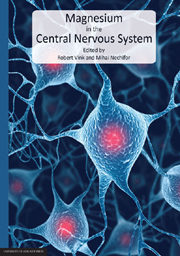Book contents
- Frontmatter
- List of Contributors
- Preface
- Contents
- Section 1 Magnesium in Normal Brain
- Chapter 1 Free magnesium concentration in human brain
- Chapter 2 Intracellular magnesium homeostasis
- Chapter 3 Magnesium transport across the blood-brain barriers
- Chapter 4 Intracellular free Mg2+ and MgATP2− in coordinate control of protein synthesis and cell proliferation
- Chapter 5 Magnesium and the Yin-Yang interplay in apoptosis
- Chapter 6 Brain magnesium homeostasis as a target for reducing cognitive ageing
- Section 2 Magnesium in Neurological Diseases
- Section 3 Involvement of Magnesium in Psychiatric Diseases
Chapter 6 - Brain magnesium homeostasis as a target for reducing cognitive ageing
from Section 1 - Magnesium in Normal Brain
Published online by Cambridge University Press: 05 June 2012
- Frontmatter
- List of Contributors
- Preface
- Contents
- Section 1 Magnesium in Normal Brain
- Chapter 1 Free magnesium concentration in human brain
- Chapter 2 Intracellular magnesium homeostasis
- Chapter 3 Magnesium transport across the blood-brain barriers
- Chapter 4 Intracellular free Mg2+ and MgATP2− in coordinate control of protein synthesis and cell proliferation
- Chapter 5 Magnesium and the Yin-Yang interplay in apoptosis
- Chapter 6 Brain magnesium homeostasis as a target for reducing cognitive ageing
- Section 2 Magnesium in Neurological Diseases
- Section 3 Involvement of Magnesium in Psychiatric Diseases
Summary
Abstract
In the general deterioration of physiological functions that takes place in aging, the prevalence of cognitive impairments, and particularly of those related to learning and memory, makes these deficits a major concern of public health. Although the exact nature of cellular and molecular substrates underlying learning and memory still remains an open issue for the neurobiologist, the current hypothesis views it is determined by the capacity of brain neuronal networks to express short- and long-term changes in synaptic strength. Accordingly, the capacity of functional plasticity is impaired in the brain of aged memory-deficient animals. Short-term changes in synaptic transmission closely depend on transmitter release and neuronal excitability while long-term modifications are mainly related to the activation of the N-methyl-D-aspartate receptor (NMDA-R), a subtype of glutamate receptors. Because transmitter release, neuronal excitability and NMDA-R activation are modulated by magnesium (Mg2+), a change in brain Mg2+ homeostasis could affect synaptic strength and plasticity in neuronal networks and consequently could alter memory capacities. In addition, alteration of brain Mg2+ levels could be regarded as a possible mechanism contributing to cognitive aging. According to these postulates, long-term increase in Mg2+ levels facilitates the conversion of synapses to a plastic state while learning and memory capacities are enhanced in adult animals fed with a diet enriched in Mg2+-L-threonate, a treatment that significantly elevates brain Mg2+ levels. Because Mg2+-L-threonate also improves learning and memory in aged animals, the regulation of brain Mg2+ homeostasis may therefore be regarded as a relevant target for the development of new pharmacological strategies aimed at minimizing cognitive aging.
- Type
- Chapter
- Information
- Magnesium in the Central Nervous System , pp. 99 - 112Publisher: The University of Adelaide PressPrint publication year: 2011
- 3
- Cited by



